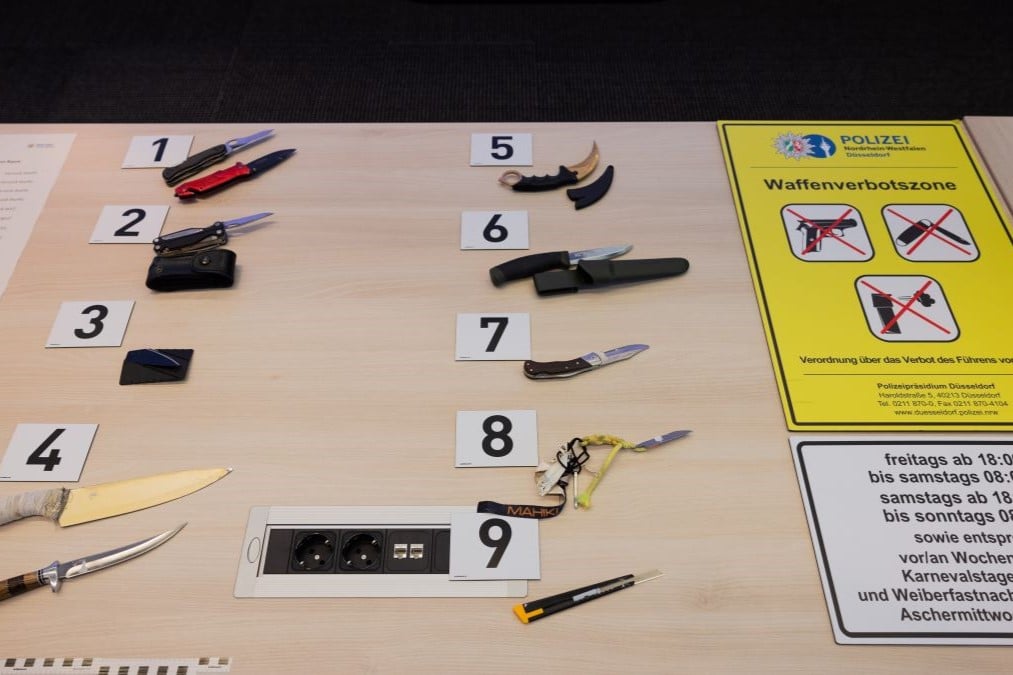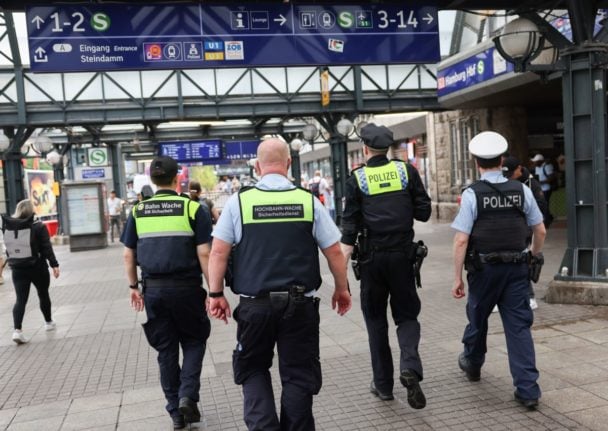Following the pandemic, crime rates in Germany has been rising and the spike in knife crime in particular has been troubling.
Earlier this month, the Interior Ministry proposed a ban on knives with blades longer than six centimetres in public places. The proposal came out on the same day that police data was released which showed that knife crime had increased across Germany.
A fatal knife attack in Solingen, allegedly by a failed Syrian asylum seeker with links to the Islamic State (IS) group has pushed the issue near to the top of the agenda again.
And in general, these numbers appear to be continuing upward, especially in busy public spaces like train stations.
READ ALSO: How dangerous is Frankfurt central station and the Bahnofsviertel?
Police recorded 430 cases of knife crimes in train stations in the first six months of 2024, as opposed to 777 cases in all of 2023.
This trend can also be observed locally. At the beginning of August, RBB reported that Berlin’s Charité hospital treated as many stab wounds in the first half of the 2024 as it typically would in an entire year.
The interior minister of North Rhine-Westphalia also recently shared statistics on violent crime and knife crime in the western state.
According to the report, which was reviewed by Der Spiegel, a total of 108,000 violent crimes were registered in North Rhine-Westphalia in 2019 – 3.1 percent of those (3,400 cases) involved knives.
Both of those figures shrunk in 2020 and 2021 – during Covid pandemic restrictions – and then began to trend upward since 2022.
In 2023 a total of 131,000 violent crimes were recorded in North Rhine-Westphalia, and 2.7 percent of them (3,500 cases) involved knives
Roughly 35 percent of these crimes were threats (where the suspect pulled out a knife during an altercation), another 35 percent involved injury, 18 percent were aggravated robbery, and just over two percent were homicides or attempted homicides.
One glaring trend among the crimes was that the perpetrators tended to be young males, and non-Germans were over-represented. About half of the suspects in 2023 were under 21 years old, and 45 percent did not have German citizenship.
However, criminologists warn that police statistics often give a skewed view of trends in crime.
Criminologist Dr. Dirk Baier recently explained in an interview with MDR that rates of “non-German” suspects tend to be inflated because they also include tourists and foreign students for example.
READ ALSO: Why experts say Germany’s rising crime rate is misleading
Baier suggests that one’s likelihood to carry a knife has more to do with their living conditions than with their nationality: Among those living in large asylum shelters “it is not so surprising that people equip themselves with knives in these somewhat dangerous environments”.

What is being done against knife crime in Germany?
German leaders at both federal and state levels have been calling for tougher measures to combat knife crime. These calls have intensified following recent events, particularly following a high profile knife attack in Mannheim in May and again in the wake of the attack in Solingen.
READ ALSO: ‘Ban asylum seekers’ – How Germany is reacting to Solingen knife attack
Certain bladed weapons, like butterfly knives, are already outlawed in Germany, and carrying one can result in a prison sentence of up to three years or a fine.
Additionally knives that can be opened quickly with one hand – such as switch blades – and knives with blades longer than 12 centimetres can not be carried in public spaces.
But leaders are proposing to intensify regulations further.
In a statement delivered on the site of the attack in Solingen, Chancellor Scholz promised action: “We will now have to tighten up the weapons regulations… in particular with regard to the use of knives…I’m sure this will happen very quickly”.
On Thursday afternoon Interior Minister Nancy Faeser reiterated that the government is preparing a series of “tough measures”.
Among them is that carrying knives at festivals as well as “sports events and other similar public events” will be banned, Faeser said.
A ban will also be introduced on long-distance trains, the minister said, with police given more powers to search members of the public for knives.
READ ALSO: Germany announces tougher knife laws after Solingen attack
While the Federal government finalises their proposals, North Rhine-Westphalia interior minister Reul has already come out with his own 10-point plan for his state.
In brief, his proposals include:
- Prevention campaigns at refugee shelters
- Expansion of “Action days against violent crime”
- Expansion of weapon prohibition zones
- More intensive focus on repeat offenders
- Repeat offenders prohibited from driving
- Repeat offenders prohibited from carrying weapons
- All suspects to be questioned personally by police following incidents
- Increased video surveillance in nightlife zones
- Increased police cooperation with local pubic order offices
Most of Reul’s proposals essentially amount to beefing up efforts that are already in effect, such as increasing checks in weapon prohibition zones or increasing video surveillance in nightlife districts.
But at least two of Reul’s points would be new tactics: prevention campaigns at refugee shelters and having police personally question all suspects involved in knife crimes (currently in minor cases suspects might only receive a letter the mail).
According to criminologist Dr. Baier, stricter laws tend not to be an effective method for reducing crime. “That won’t scare off young perpetrators,” he told MDR.
But the importance of prevention programs is one tactic that the interior minister and the criminologist agree on. Baier suggests that more youth education on the topic is needed.
Reul’s proposal would see police officers conducting personal conversations at refugee shelters, explaining that knives are prohibited in public spaces.



 Please whitelist us to continue reading.
Please whitelist us to continue reading.
Member comments